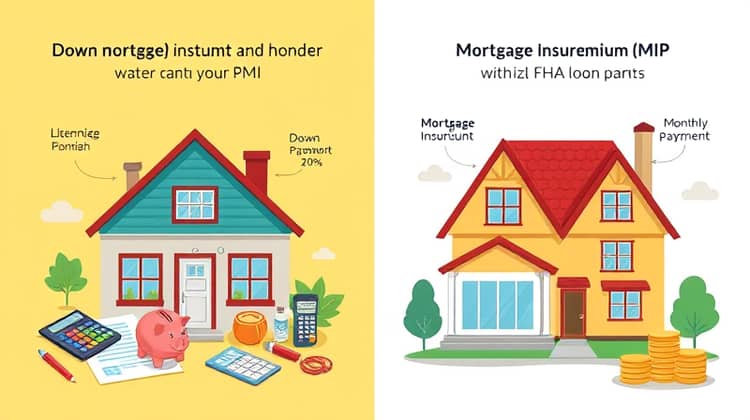Mortgage insurance is an essential topic for anyone considering buying a home, especially for first-time buyers. It serves a vital role in helping individuals qualify for home loans while maintaining a level of risk management for lenders. The purpose of this blog post is to educate potential homeowners on the various aspects of mortgage insurance, its costs, types, and whether they truly need it.
In the following sections, we will delve into key points such as what mortgage insurance is, why lenders require it, the different types available, and how to potentially avoid it. Understanding these aspects can significantly influence your financial decisions when purchasing a home, ultimately making the home-buying experience smoother.
We will also discuss the advantages and disadvantages of mortgage insurance, giving you a balanced view of its implications. By the end of this article, you should have a clearer picture of what mortgage insurance entails and whether it aligns with your homeownership plans. Stay tuned as we unravel this critical component of the home-buying process.
What is Mortgage Insurance?

Mortgage insurance is a policy that protects lenders against losses if a borrower defaults on their mortgage loan. This type of insurance is typically required when a borrower has a down payment of less than 20% of the home's purchase price. It ensures that lenders can recoup some of their losses if they need to foreclose on a property and sell it at a lower price than it was originally bought for.
There are two main types of mortgage insurance: private mortgage insurance (PMI) and mortgage insurance premium (MIP). PMI is usually associated with conventional loans, while MIP applies to FHA loans. Borrowers who pay for mortgage insurance do so to get the financing they need to buy a home even if they can't make a large down payment.
Mortgage insurance can be a confusing and often misunderstood concept. Many borrowers mistakenly believe it is the same as homeowners insurance; however, homeowners insurance protects the homeowner's property, while mortgage insurance protects the lender's financial interests. This distinction is vital as it affects financing costs and homeownership experience.
Why Do Lenders Require Mortgage Insurance?

Lenders require mortgage insurance primarily to minimize their risk when they agree to lend money to borrowers who cannot provide a substantial down payment.
- It protects the lender against financial loss in case of borrower default.
- It enables borrowers to secure financing with lower down payments, making homeownership accessible to more people.
- Lenders can offer lower interest rates with mortgage insurance, making monthly payments more affordable.
Ultimately, mortgage insurance serves both the lender and the borrower by facilitating home purchases and spreading the risk involved.
Types of Mortgage Insurance

As mentioned earlier, the two main types of mortgage insurance are PMI and MIP. Each serves different loan types and comes with its own requirements and costs.
Private Mortgage Insurance (PMI) is typically required for conventional loans when the down payment is less than 20% of the home's price. The cost of PMI varies by lender and the size of the loan but can be paid as a monthly premium, one-time upfront payment, or a combination of both.
Mortgage Insurance Premium (MIP) is required for FHA loans and operates similarly to PMI but with different insurance guidelines and costs. MIP also involves upfront costs that must be paid at closing and monthly premiums thereafter, depending on the loan amount and terms.
- Private Mortgage Insurance (PMI) for conventional loans.
- Mortgage Insurance Premium (MIP) for FHA loans.
- Lender-paid mortgage insurance (LPMI) where the lender pays the premium in exchange for a higher interest rate.
Understanding the types of mortgage insurance helps borrowers make more informed choices related to their financing options and long-term financial strategy.
How Much Does Mortgage Insurance Cost?

The costs of mortgage insurance can vary dramatically based on several factors, including the type of loan, the size of the down payment, and the borrower's credit score. Generally, PMI can cost anywhere from 0.3% to 1.5% of the original loan amount per year, which translates to $30 to $150 per month for every $100,000 borrowed.
Pros and Cons of Mortgage Insurance

Mortgage insurance comes with advantages. For instance, it enables homebuyers to purchase homes without a significant down payment, thus opening doors for individuals or families who may not have a substantial amount of savings. It also offers lenders assurance, potentially leading to more lenient lending criteria and interest rates.
However, there are disadvantages to consider as well. Mortgage insurance adds an additional monthly payment that can strain budgets and increase the overall cost of homeownership. Furthermore, this insurance does not build equity for the homeowner—payments go purely toward protecting the lender.
- Enables low down payment options for homebuyers.
- Facilitates access to homeownership for those with limited savings.
- Potentially lowers interest rates for borrowers with mortgage insurance.
- Could raise monthly financial burdens on homeowners.
Evaluating these pros and cons can help potential homeowners decide if obtaining a mortgage with insurance is the best choice for their financial situation.
Do You Need Mortgage Insurance?

Generally, if you're making a down payment of less than 20% on a home, mortgage insurance may be required by your lender. This insurance gives you more opportunities to buy a home sooner rather than saving for a larger down payment, which can take several years.
It is crucial to assess your current financial situation, including your affordability and credit score, as these factors can influence your lender's decision regarding the necessity for mortgage insurance. Additionally, consider whether you can manage the monthly premium and its impact on your overall budget.
How to Avoid Mortgage Insurance

Although mortgage insurance is a common requirement when financing a home, there are strategies to avoid it. One approach is to save for a larger down payment—ideally, 20% or more—which typically eliminates the need for mortgage insurance altogether.
Another option is to seek lenders that offer no-PMI loan products. Some lenders provide unique products that allow you to bypass mortgage insurance fees while also having a lower down payment.
- Save for a larger down payment (20% or more).
- Consider no-PMI loan products from specific lenders.
- Explore government programs that facilitate homeownership without mortgage insurance.
Using these strategies enables buyers to reduce unnecessary costs and improve their financial footing when entering homeownership.
Conclusion

In summary, mortgage insurance is a critical component for many homebuyers, particularly those making smaller down payments. While it can help open doors to homeownership for those who may not have extensive savings, it does come with additional costs that can influence monthly budgets and overall affordability. Understanding the nuances of mortgage insurance can aid buyers in their decision-making process.
When determining if you need mortgage insurance, it’s essential to consider not only the immediate financial impact but also long-term implications on home equity and ownership costs. It's also advisable to weigh the available options for avoiding mortgage insurance whenever possible.
In the current financial landscape, being informed about mortgage insurance can empower potential homeowners to navigate their home-buying journey effectively. By knowing the requirements, types, costs, and alternate options, buyers can make smarter financial decisions.
Ultimately, whether you decide to engage with mortgage insurance depends on your unique financial situation and housing needs. However, with the right knowledge and planning, homeownership can be a reality that is within reach.














